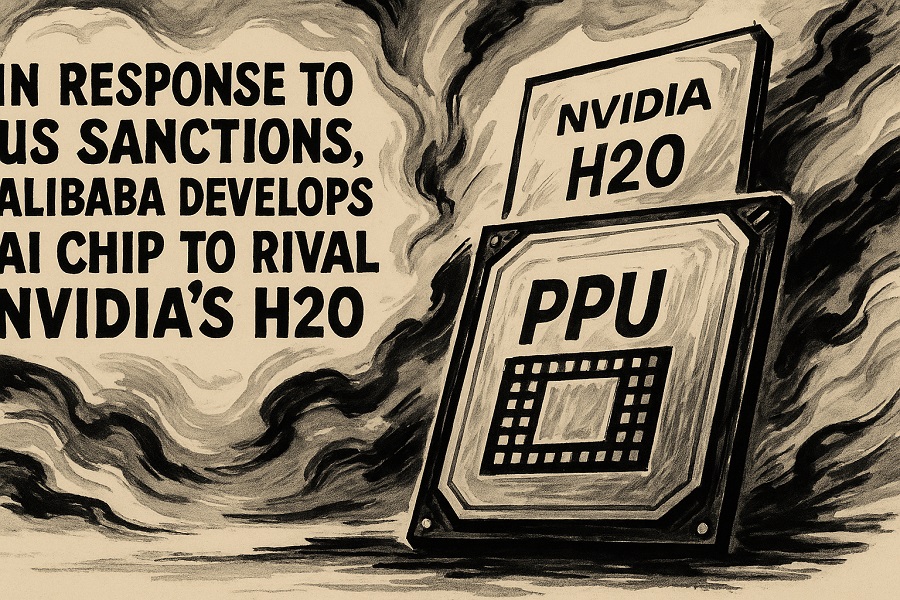Blog
In response to the US sanctions, Alibaba has launched an AI chip that is claimed to be similar to NVIDIA’s H20 chip. But is this just a promotional slogan or a new option that can truly change the market landscape?

The competition in AI chips is no longer confined to Silicon Valley in the United States. Alibaba, through its chip subsidiary “Pingtouge”, has released a new AI chip, which is said to be able to compete with NVIDIA’s H20. This clearly demonstrates China’s determination: to no longer rely on Western technology and to become a true player in the field of AI hardware. This news has been reported by China Central Television (CCTV) and several professional media outlets. The timing of this release is also quite special. It happens right after the United States imposed strict GPU export restrictions on China. Chips like the A100, H100, and the most recent H20 are not allowed to be sold to China.
This chip is temporarily called “PPU” (Processing Power Unit, which can be understood as “computing power processing unit”) for now. It not only represents a technological achievement but also conveys a political signal It hopes to offer a local option to those data centers and cloud service companies in China, as the training of many large language models and computer vision nowadays cannot do without NVIDIA graphics cards.
Alibaba’s semiconductor division, “Pingtouge”, said that the new AI processor they have developed can match the performance of NVIDIA’s H20 GPU specifically designed for the Chinese market.
This presentation was broadcast on a program of China Central Television on Tuesday, September 16th. The new “PPU” chip of “Pingtouge” was directly compared with NVIDIA’s H20 and A800, as well as Huawei’s Ascend 910B. There is a chart in the program showing that the performance of Alibaba’s chips is similar to that of NVIDIA’s.
According to the parameters shown in the program and the report of the South China Morning Post, this ASIC chip specifically designed for AI work has 96GB of HBM2e memory, with an inter-chip interconnection bandwidth of up to 700GB per second. It also supports PCIe and has a power consumption of 400 watts. Although the program did not disclose the specific testing methods and raw data, this was the first public benchmark test that placed Alibaba’s hardware on the same level as NVIDIA’s data center Gpus.
Reuters reported that China Unicom has deployed 16,384 PPU chips from Alibaba in its infrastructure, which accounts for more than half of the approximately 23,000 domestic accelerators currently installed at the base in Qinghai. The combined power of these chips amounts to 3,579 petaFLOPS. After all the stages are completed, the computing power of this base will exceed 20,000 petaflops.
Comparison with NVIDIA H20: An asymmetrical Contest
Comparing Alibaba’s PPU with NVIDIA’s H20 is like a collision of two different concepts.
Nvidia’s H20 is designed to bypass the export restrictions imposed by the United States. It remains a high-end computing card and is supported by NVIDIA’s extensive CUDA software ecosystem as well as its years of experience in optimizing AI frameworks. This ensures that it can be smoothly integrated into the training and reasoning processes of major technology companies.
While Alibaba’s chips are striving to catch up with standards in terms of hardware, they also aim to excel in energy efficiency and inter-chip bandwidth. But its greatest challenge is not just pure performance. It needs to establish a software ecosystem that can compete with CUDA, or at least be well compatible with mainstream AI frameworks such as PyTorch, TensorFlow and JAX. If the software lags behind, even if the hardware is excellent, it may not be able to play its due role.
This presentation by CCTV not only holds technical significance but also has a strong geopolitical background.
Nvidia’s H20 was launched to comply with the export control regulations of the United States, which restricted the sale of high-performance chips to China. The H20 is based on NVIDIA’s Hopper architecture, but has been weakened to meet the restrictive requirements. It has 96GB of HBM3 memory, with a memory bandwidth of approximately 4.0TB per second. This provides a reference for comparing Alibaba, which also has 96GB of HBM2e memory, but this does not necessarily reflect the actual performance gap.
The biggest unknown now is the software. Alibaba, of course, is eager to prove that they can meet the domestic demand for AI hardware on their own, but they have not disclosed any details about the framework, toolchain or compatibility with the existing model stack. Before independent benchmark testing and developer support catch up, it seems that whether PPU and NVIDIA’s chips are on an equal footing is merely a claim supported by Chinese official TV stations and has been recognized by the Chinese government.
In addition to these data, this release by Alibaba also has a strong symbolic significance. Since 2022, the restrictions imposed by Washington, D.C., on China’s export of high-end Gpus have been aimed at slowing down the development of China’s AI capabilities, as AI is regarded as strategic both economically and militally. Nvidia had to bypass these bans and launched performance-weakened versions for the Chinese market, such as the A800, H800 and H20.
A giant like Alibaba has developed its own chips domestically, which indicates Beijing’s determination: it will invest heavily to reduce this technological reliance. It is no coincidence that this news was reported by Chinese official media: its aim is to show everyone that despite sanctions, China can still produce competitive substitutes. This is in line with a larger trend, that is, companies like Huawei are also investing in their own hardware solutions.
H20芯片差不多的AI芯片-Alibaba-has-launched-an-AI-chip-that-is-claimed-to-be-similar-to-NVIDIAs-H20-chip.jpg)
Alibaba has launched an AI chip that is claimed to be similar to NVIDIA’s H20 chip
Can China now completely get rid of its reliance on NVIDIA chips?
A spokesperson for NVIDIA said in a statement, “Cybersecurity is of Paramount importance to us.” There is no “backdoor” in NVIDIA’s chips, and no one can remotely access or control them. However, it should be emphasized that the relevant Chinese institutions have not specifically stated which American experts discovered the “backdoor” in NVIDIA’s products, nor have they indicated whether China’s own tests yielded the same results.
Paul Triolo is a Chinese technology expert and a partner of DGA-Albright Stonebridge Group. He expressed his skepticism about the claim that a backdoor was deliberately implanted in NVIDIA’s hardware and pointed out that the news lacked details. In the past, Chinese authorities and industry associations have also accused American companies of posing security risks, but the outcomes were all different.
In early 2023, China banned major domestic infrastructure operators from purchasing Micron’s products, claiming that their investigation found serious security risks in the products of this American memory chip manufacturer. Last year, the China Cybersecurity Association, an industry organization, also demanded a security review of the products sold by Intel in China.
In addition, Nvidia is also facing anti-monopoly investigations in China. At the end of 2024, the State Administration for Market Regulation announced that it was investigating the chipmaker for suspected violations of China’s anti-monopoly law. Nvidia is also suspected of violating its original commitment when it acquired the Israeli chip design company Mellanox Technologies. Some critics believe that China may want to restrict NVIDIA’s entry into its market.
Tilly Zhang, an analyst at Gavekal Dragonomics, said, “NVIDIA’s chips are no longer essential for China now.” They can be easily placed on the negotiating table. China now clearly has more courage and ability than before to carry out domestic substitution and no longer relies on foreign technology. Nvidia’s CEO, Jensen Huang, also visited China this year.
Huang Rengxun attempted to demonstrate his commitment to the Chinese market. He met with government representatives and praised the progress China has made in AI. The statement from relevant Chinese institutions did not specify the potential security risks, nor did it explain how the Chinese government intends to respond. Some people believe that this might be a response to similar accusations made by the United States against Chinese tech giants.
The CEO of NVIDIA warned that Chinese competitors have become very powerful
In an interview with Bloomberg in May this year, Huang Rengxun said that due to the trade restrictions imposed by the United States, American companies have had to give up the Chinese market, and Chinese competitors are filling this gap. Analysts have been warning for years that the restrictions imposed by the United States might have the opposite effect, instead promoting innovation among Chinese companies and strengthening the power of Chinese giants.
In the interview, Huang Renxun said that China’s technology industry is becoming stronger. “China’s competitors have developed,” said Huawei, a Chinese giant blacklisted by the US government, which has become “very powerful”. Huang Renxun said, “Like everyone else, their capabilities are doubling or even quadrupling every year.” And the scale is also growing significantly.”
Huang Renxun emphasized that the performance gap between American products and Chinese substitutes is narrowing. Huawei’s latest AI chip “has performance comparable to NVIDIA’s H200 chip”, and before the H200 was replaced in recent months, it was the most advanced technology. According to the restrictive regulations, NVIDIA is not allowed to sell its H20 chips to China. This key chip is a downgraded version of the H200.
When Huang Renxun talked about this chip, he said, “Its performance can no longer be further reduced.” Nvidia is considering potential alternatives to the H20, but there are no plans to launch a new chip for now. If it is to be launched in the future, the company must first obtain approval from Washington. The importance of the Chinese market should not be underestimated. Because there are the largest number of AI researchers in the world here.
Many reports say that China’s industrial sector is increasingly turning to alternative solutions provided by Huawei. Therefore, the restrictions imposed by the United States may not only help China gain an edge in the global AI race, but also enable Huawei to become a global AI chip power.
An important milestone, but not yet a revolution
By releasing this PPU, Alibaba has sent a clear message: In the race of AI processors, China will not merely be a bystander. The released parameters show that they do have the ambition to compete with NVIDIA, especially in terms of memory, bandwidth and energy efficiency. But to truly succeed, they cannot merely stop at technical comparisons; they also need to address the real key issues: the software ecosystem, mass production, and the acceptance of developers.
For IT professionals, this news serves as a reminder of a reality: NVIDIA’s monopoly position may be challenged in the coming years, at least in some parts of the world. In a market where the rise of large AI models has led to a sharp increase in demand, any competitive alternative has the potential to change the entire market landscape.
Source : SCMP



